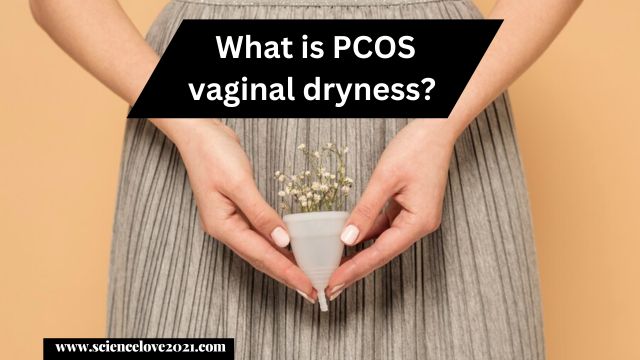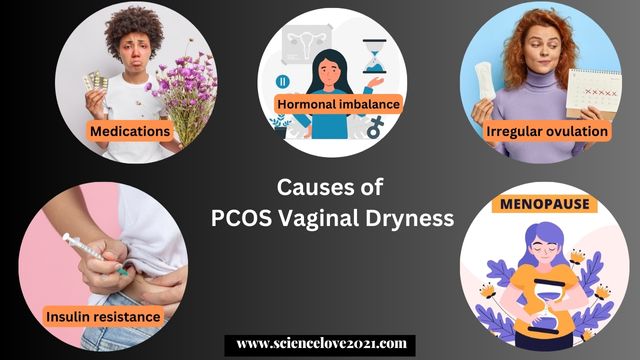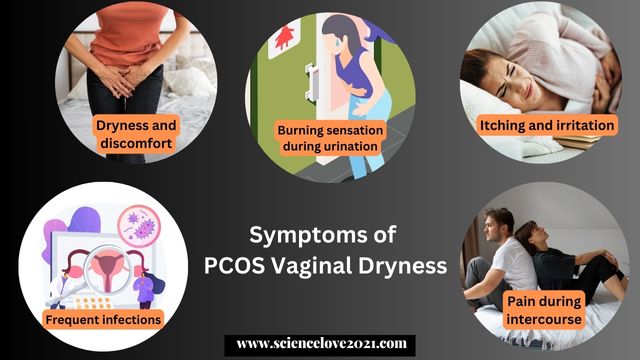What is PCOS vaginal dryness?
PCOS Vaginal dryness is a common symptom of polycystic ovary syndrome (PCOS). PCOS is a hormonal disorder that affects 10% of women of reproductive age. It is caused by an imbalance of reproductive hormones, including estrogen.
Estrogen works to keep the vaginal lining healthy and moist. When estrogen levels are low, the vaginal lining becomes thin and dry. This makes sex painful and increases the risk of vaginal infection.
Does PCOS cause vaginal dryness?
Polycystic ovary syndrome (PCOS) may be a factor in vaginal dryness, but it is not the only cause.
PCOS is a hormonal imbalance that affects ovulation and also leads to many other symptoms.
PCOS causes vaginal dryness for several reasons. Some of these are as follows:
First, women with PCOS often have high levels of androgens, which are hormones secreted in men. Androgens reduce the effects of estrogen and make the vaginal lining dry.
Second, women with PCOS often have irregular or missed periods. This is because they do not ovulate regularly. When ovulation does not occur, the ovaries do not produce as much estrogen.
Causes of PCOS Vaginal Dryness
PCOS Vaginal dryness is caused by a combination of several factors, including:
1. Hormonal imbalance: Women with PCOS often have high levels of androgens (male hormones) and low levels of estrogen (female hormones). Androgens reduce the effects of estrogen and make the vaginal lining dry.
2. Insulin resistance: Many women with PCOS also have insulin resistance, leading to hormonal imbalance. High insulin levels cause sex hormone-binding globulin (SHBG) levels to decrease, which reduces the availability of estrogen in the body.
3. Irregular ovulation: Women with PCOS often have irregular or missed periods. This is because they do not ovulate regularly. When ovulation does not occur, the ovaries do not produce as much estrogen.
4. Medications: Some medications used to treat PCOS, such as birth control pills and metformin, also cause vaginal dryness.
Apart from these factors, many other factors cause vaginal dryness in women suffering from PCOS. This factor is as follows –
1. Stress: Stress makes PCOS symptoms worse, including vaginal dryness.
2. Menopause: As women approach menopause, their estrogen levels naturally begin to decline. It can cause vaginal dryness in all women, but it is more common in women with PCOS.
3. Certain medical conditions: Certain medical conditions, such as diabetes and Sjogren's syndrome, also cause vaginal dryness.
If you have PCOS and are experiencing vaginal dryness, it's important to talk to your doctor.
Read also: Diabetes
Symptoms of PCOS Vaginal Dryness
Recognizing the symptoms of vaginal dryness related to PCOS is important for early intervention and management. These symptoms are generally similar to the symptoms of vaginal dryness. Let's take a look at them:
1. Dryness and discomfort: The most obvious sign is dryness in the vaginal area, causing discomfort and pain during intercourse.
2. Itching and irritation: Dryness causes itching and irritation around the vagina, which is frustrating and irritating at times.
3. Frequent infections: Vaginal dryness makes the area more susceptible to Infections like yeast infections or bacterial vaginosis.
4. Pain during intercourse: Painful intercourse (dyspareunia) is a common result of vaginal dryness, potentially affecting a woman's intimate life.
5. Burning sensation during urination: Due to vaginal dryness, women feel a burning sensation during urination, which is sometimes painful.
Effect of PCOS vaginal dryness
PCOS Vaginal dryness can have many negative effects on a woman's life. Let's take a look at some of the effects -
1. Painful sex: Vaginal dryness makes sex painful and difficult. This can lead to decreased sexual satisfaction and relationship problems.
2. Increased risk of infection: Vaginal dryness increases the risk of vaginal infections, such as yeast infections and bacterial vaginosis.
3. Discomfort during everyday activities: Vaginal dryness causes discomfort during everyday activities, such as sitting, exercising, and using the toilet.
4. Emotional impact: Vaginal dryness has a negative emotional impact on women. This leads to self-consciousness, embarrassment, and feelings of inadequacy.
PCOS Vaginal dryness has a negative impact on women, affecting their personal life. Contacting a doctor is a better option if such symptoms appear.
Solutions or Treatment for PCOS Vaginal Dryness
Hormone therapy
1. Consult a healthcare professional who specializes in PCOS to explore hormone therapy options.
2. Hormone replacement therapy (HRT) is prescribed to maintain hormonal balance and reduce vaginal dryness.
3. Topical estrogen creams help improve vaginal moisture and relieve discomfort.
lifestyle modifications
1. Dietary changes: Adopt a low glycemic index diet to prevent insulin resistance, as it indirectly improves hormonal balance.
2. Regular exercise: Regular Physical activity controls insulin levels and reduces inflammation.
3. Stress management: Stress increases hormonal imbalance, so practice stress-reducing techniques like yoga, meditation, or deep breathing exercises.
Vaginal lubricants and moisturizers:
1. Over-the-counter or prescription vaginal lubricants and moisturizers provide immediate relief from dryness during sexual activity.
2. To avoid irritation choose products that are water-based and free of harsh chemicals.
Avoid harsh soaps and douches:
1. Use mild, fragrance-free soap for intimate hygiene. This maintains the natural pH balance of the vagina.
2. Avoid douching, as it can disrupt the vaginal flora and increase dryness.
Natural remedies
1. Coconut oil, aloe vera gel, or vitamin E oil can be applied topically to reduce dryness naturally.
2. Probiotics containing Lactobacillus strains help restore and maintain a healthy vaginal flora.
Regular Medical Checkup
You should have regular checkups to monitor your PCOS symptoms and address any concerns related to vaginal dryness.
Things to keep in mind if you have PCOS vaginal dryness
Here are some things to keep in mind if you have PCOS vaginal dryness:
1. This is a common symptom: PCOS Vaginal dryness is a very common symptom of PCOS, affecting up to 70% of women with the condition.
2. It's not your fault: PCOS Vaginal dryness is caused by a combination of several factors, including hormonal imbalance, irregular ovulation, and certain medications. It's not something you're doing to cause it.
3. There are some things you can do to manage it: There are several treatments available for PCOS vaginal dryness, including vaginal moisturizers, lubricants, and estrogen therapy. You can also manage your symptoms at home, Such as avoiding bathing, keeping yourself hydrated, avoiding smoking and excessive alcohol consumption, and wearing loose-fitting clothing made from natural fabrics.
Here are some additional tips for managing PCOS vaginal dryness:
1. Be patient it takes some time to find the right treatment for you. Don't be discouraged if your symptoms don't improve immediately.
1. Communicate with your partner: Talk to your partner about your PCOS vaginal dryness. They can be supportive and understanding and can help you find ways to make sex more comfortable.
1. Don't give up sex: PCOS Vaginal dryness can make sex painful, but it doesn't mean the end of your sex life. There are many things you can do to make sex more comfortable such as using vaginal moisturizers or lubricants.
Remember, you are not alone. PCOS Vaginal dryness is a common symptom of PCOS, and there are several things you can do to manage it.
conclusion
PCOS Vaginal dryness is a real concern for many women with this condition, but it's important to understand that there are effective solutions available. By addressing the root causes and symptoms of vaginal dryness, you can improve your overall quality of life and enjoy a healthy, satisfying intimate life.
FAQs
1. How does PCOS affect intimacy?
PCOS affects intimacy in many ways, some of which are:
・Decreased sex drive: PCOS causes decreased sex drive or libido. This can be caused by several factors, including hormonal imbalance, weight gain, and body image issues.
・Sexual dysfunction: PCOS also causes sexual dysfunction, such as difficulty becoming aroused, painful sex, and difficulty reaching orgasm. There are many reasons, including hormonal imbalance, vaginal dryness, and low self-esteem.
・Fertility problems: PCOS also causes fertility problems, which are a source of stress and anxiety for couples.
2. Can PCOS heal on its own?
PCOS is a long-term condition, so it cannot be cured. But, there are many things that women with PCOS can do to manage their symptoms and improve their health. This includes lifestyle changes, such as eating a healthy diet, exercising regularly, and maintaining a healthy weight. Several medications are used to treat PCOS symptoms.
3. Can PCOS cause low estrogen?
PCOS reduces estrogen levels in some women. This occurs because PCOS is often associated with high levels of androgens, which block the production of Estrogen. Low estrogen levels lead to several symptoms, including irregular menstruation, vaginal dryness, and difficulty sleeping.
4. Why are PCOS periods so heavy?
Heavy menstruation can occur due to hormonal imbalances associated with PCOS. These imbalances cause overgrowth of the uterine lining, the endometrium. When the endometrium grows, it sheds more during menstruation.
5. Does hydration help PCOS?
Hydration is necessary for everyone, including women with PCOS. Staying hydrated helps improve insulin sensitivity, reduce inflammation, and promote weight loss. All these things are beneficial for women suffering from PCOS.





No comments:
Post a Comment